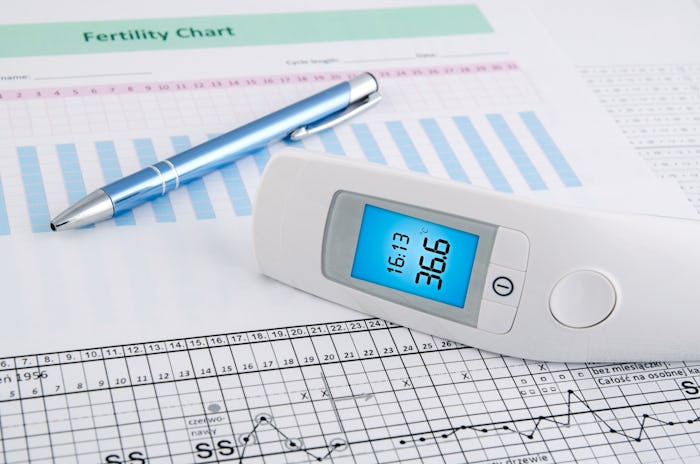Life
How To Tell If You're Ovulating & 4 Other Signs Your Body Is Primed For Baby Making
There are many methods that assist in getting pregnant, and figuring out how to tell if you're ovulating plays an important part. For anyone who fell asleep in Biology class, the American Pregnancy Association notes that ovulation is the process where one of your ovaries release an egg, which is then pushed down your fallopian tube and eventually fertilized by sperm. If not fertilized, the egg will simply dissolve. If the egg is fertilized with a sperm, it will then move into the uterus, and implant into the uterine wall, beginning a pregnancy. Ovulation generally occurs fourteen days after the beginning of your period, and the window for optimal baby making is a short one. Although sperm can live up to six days inside your body,your egg is only viable for 12 hours after its release, giving those swimmers very little time to do their job.
Because of this, you want to maximize the chances of getting pregnant by timing sex to match up with ovulation. In order to do that, you have to know when you’re ovulating. Being aware of your ovulation cycle not only to assists in your effort to conceive, but also to understand your own hormonal, emotional and physical cycles.Having sex during ovulation doesn’t guarantee a baby, but it definitely ups your odds.
So if you’re looking to add a little one to the mix and want to improve the odds, it’s important to learn the signs of ovulation. Here, five signs that your body may be ready to make a baby.
1You Are Horny As Hell
No this isn't just an opinion — it's backed by science. Researchers at the University of Lethenberger in Canada found that women have more sexual fantasies, and are thereby more aroused during ovulation. You’ll start feeling frisky a few days before ovulation, and sperm hang around for up to seven days, so this is the time you want to have sex to maximize the chance of a pregnancy.
2Your Underwear Has Discharge
When you’re not ovulating, your underwear usually remain free from any unidentifiable liquid. (And if there is some, it’s generally very thick.) But in the days leading up to ovulation, the American Pregnancy Association notes that you may notice a clear, watery and stretchy vaginal discharge – similar to a raw egg white in consistency. This is known as cervical mucus, and the excess amount makes it easier for sperm to swim to the homeland (i.e. your egg.)
3Your Breasts Feel Different
Are you breast especially painful? That may be a good sign. According to Hopkins Medicine, the the hormonal changes during ovulation may cause soreness on the tops of side of your breast. Just let your partner know before sex so they can avoid any nipple-related foreplay.
4You Are Hot
Well, hotter than usual. According to Parents, the surge in progesterone during ovulation increases your basal body temperature by half a degree. Because this is such a small measurement, it’s important to purchase a basal thermometer and take your temperature regularly to have a baseline. Then when the temperature changes, you’ll know it’s on.
5Your Cervix Is High
As Baby Center notes, the cervix rises higher in the canalduring ovulation. And the only way to test this out is to feel yourself. So wash your hands, and slide a finger gently up inside your vaginal canal. Do you feel a protruding nub? Well, that’s your cervix! Now take some time to explore the area. If the cervix feels soft or rises above the canal, then that’s your body’s way of saying let’s make a baby! Is the nub raised above the canal? You will be able to feel a protruding nub- that’s your cervix. Take note of the feel of the cervix. That’s how your body says: I’m ovulating, and I’m ready to get pregnant!
